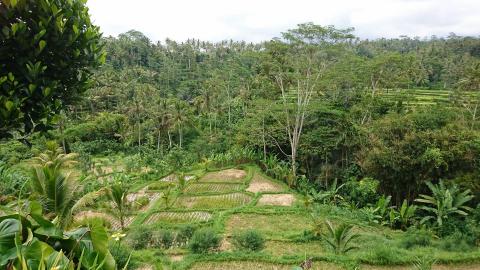Significant global landcover change had occurred by then, so if a new epoch really did start, it was not in the 20th century, finds a new study by a large international team of archaeologists and environmental scientists behind the ArchaeoGLOBE project.
The scholars pooled extensive datasets summarizing decades of archaeological research. Nicole Boivin, Director of the Department of Archaeology at the Max Planck Institute for the Science of Human History and a lead author on the study, notes that "archaeologists possess critical datasets for assessing long-term human impacts to the natural world, but these remain largely untapped in terms of global-scale assessments". She observes that "this novel crowd-sourcing approach to pooling archaeological data is extremely innovative, and has provided researchers with a unique perspective".

The Anthropocene; human transformation of slopes for rice farming, such as in Ubud, Bali. Image: Andrea Kay
The ArchaeoGLOBE project was coordinated by internationalresearchers who developed an online survey to gather past land-use estimates from archaeologists with regional expertise. The current study offers a novel way to assess archaeological knowledge on human land use across the globe over the past 10,000 years.
Study of archaeological data reveals impact of humans over thousands of years
By incorporating online archaeological crowdsourcing, the study was able to incorporate the local expertise of 255 archaeologists to reach an unprecedented level of global coverage. This global archaeological assessment, and the collaborative approach it represents, will help stimulate and support future efforts towards the common goal of understanding early land use as a driver of long-term global environmental changes across the Earth system, including changes in climate.
"This type of work causes us to rethink the role of humans in environmental systems, particularly in the way we understand 'natural' environments," said Lucas Stephens of the University of Maryland Baltimore County, University of Pennsylvania and Max Planck Institute for the Science of Human History, who led the global collaboration of archaeologists that produced the study. "It also allows us to identify patterns in the distribution of our data and prioritize future collection areas to improve the reliability of global datasets."
"It's time to get beyond the mostly recent paradigm of the Anthropocene and recognize that the long-term changes of the deep past have transformed the ecology of this planet, and produced the social-ecological infrastructures - agricultural and urban - that made the contemporary global changes possible," said Erle Ellis of University of Maryland Baltimore County, a senior author who initially proposed and helped design the study. "These past changes produced the social-ecological infrastructures - agricultural and urban - that made the contemporary global changes possible."
So if you like who you are and the progress humanity is made, thank our ancestors who brought the Anthropocene into existence.





Comments